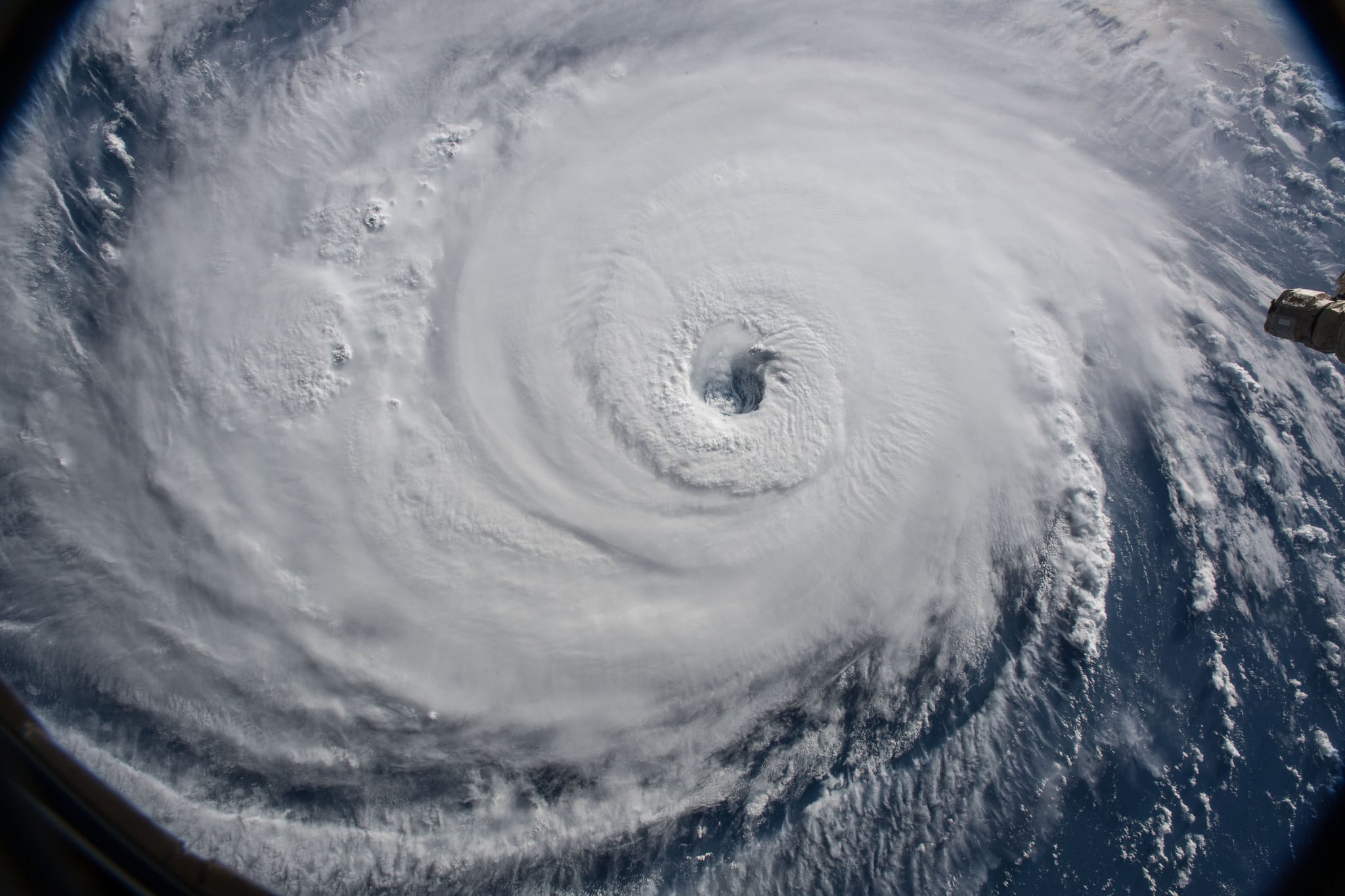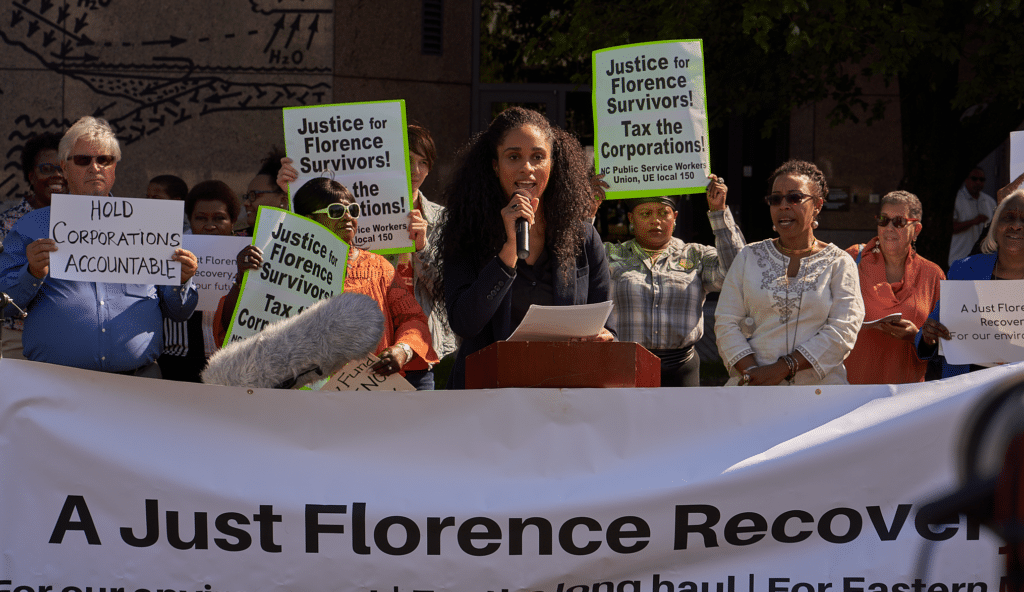
Hurricane Florence: Unearthing man-made disasters
When Hurricane Florence landed, relief efforts were already in motion. My partner and I met with citizens in Raleigh to deliver supplies in Roland and Lumberton. We set off in a packed truck — and quickly began to see the effects of the storm. Flooded cars were stranded on the roadside. Once sturdy houses now seemed to float as though they were islands. We arrived at the shelters, met by resilient and bright-eyed citizens who showed no fear in the face of tragedy. On our return home, we saw the face of the storm: a tornado, formed outside Fayetteville and flooding the Cape Fear River, blocked our way. Rain poured down for what felt like hours, and we wandered through flooded streets until a Department of Transportation driver led us out of the storm. Impacted community members gave us directions to get home.
This was just a glimpse of Hurricane Florence and the devastation it brought to our great state. And, it is far from over.
Hurricane Florence has decimated much of eastern North Carolina and parts of South Carolina. Over 1.5 million citizens have been ordered to evacuate as water levels rise and the risk of flooding increases because of the slow nature of this hurricane. Even as Hurricane Florence dissipates, residual impacts will still occur and water levels will continue to rise. Many homes and businesses have already been lost to this flooding; unfortunately, so have many lives. As the flooding progresses, more side effects surface in addition to the immediate threat of water.
North Carolina has battled against two toxic presences for years: coal ash and hog waste. Hurricane Florence magnifies the hazards presented by these two toxic problems. These topics have been under the environmental magnifying glass for years. They cycle through governmental concern but are never solved. Residents in areas near hog waste and coal ash disposal sites are proven to have increased risks of cancer. Politically, areas housing these sites are usually low-income, minority or rural due to the lack of pushback offered by such vulnerable communities.

Coal ash is typically stored in one of two ways: wet or dry. Wet storage mixes the coal ash with ponds created as a dump site, forming lagoons where toxins absorb into the ground and waters below. Dry storage consists of landfills where coal ash is dumped and left to sit — creating a large threat for airborne contagions. Hurricane Florence has caused wet storage ponds to overflow. They not only spill into communities, but also enter their water supply.
Duke Energy, the company that owns some of the polluting coal ash sites, estimated that enough coal ash to fill about 180 dump trucks leaked into surrounding waters during a weekend landfill collapse caused by flooding. Duke Energy admitted they won’t know how much of their waste really spilled into the community until the rain finally stops.
Similar to coal ash, hog waste is stored in lagoons filled with bacteria and chemicals that digest the excrement. Currently, 110 hog waste pits have overflowed into the surrounding communities. This means people in these areas are at risk of direct contact — not only with excrement, but also with harmful chemicals used to treat the excrement. The numbers of overflowing hog waste pits will only grow as flood levels rise. Having your home flooded with dirty water is horrible, but having it filled with hog excrement is deplorable — especially since this could be avoided.
The concern here: these issues are nothing new. The eastern area is still recovering from Hurricane Matthew, which carried similar destruction via hog waste and coal ash. Even after the previous damage, nothing changed. Communities are exposed yet again as these toxins come back around.
Soon, residents will be returning home. Some may not have a home at all, while others may think all is well — but have contaminated waters silently invading their taps and air space. While the dangers of flooding are very visible and obvious (you can see water flood your home), the dangers of pollution are far more hidden: airborne and waterborne threats are actively killing along with the waters which carry them.
Even after the previous damage, nothing changed. Communities are exposed yet again as these toxins come back around.
Not only are large corporations and industrial farms largely at fault for hog waste and coal ash pollution, so is the North Carolina legislature The legislature is to blame for choosing corporations over people. Rising sea levels magnify the damage caused by flooding — an issue legislators could have prevented if they chose people over development. State scientists warned legislators for years that water levels are rising due to climate change, yet state legislators silenced them and continued building with irresponsible environmental practices.
Legislation plays a major role in our everyday health, especially in times of natural disasters such as Hurricane Florence. While we deal with current dangers of pollution and flooding, it is important to keep this from happening again — by fighting on the political field. We cannot let the damage done by coal ash and hog waste go unanswered again. Legislators need to know: people will not stand by and allow factory pollution in waters and lands they pay for.
Voting incompetent legislators out in November will be cumbersome. The evacuation of numerous towns will make it difficult for residents to vote in their own counties — if at all. Residents cannot vote outside of their county. And if your home is destroyed and you are staying in a separate county, you must drive back to yours to cast a ballot. This may be too much to ask, or not on the minds of many affected by the disaster.
Yet, voting is crucial to these vulnerable communities. The sad fact: displaced people are the ones who need these votes the most.
Related Posts
Ways to Support Our Work

Read Latest News
Stay informed and inspired. Read our latest press releases to see how we’re making a difference for the planet.

See Our Impact
See the real wins your support made possible. Read about the campaign wins we’ve fought for and won together.

Donate Today
Help power change. It takes support from environmental champions like you to build a more healthy and just world.